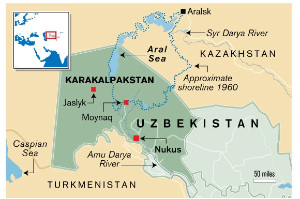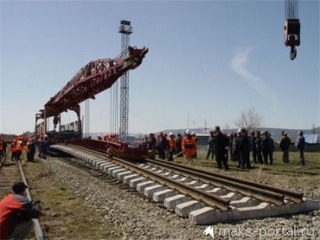New Tensions Between Kyrgyzstan and Uzbekistan
By Arslan Sabyrbekov (07/02/2014 issue of the CACI Analyst)
In response to Uzbekistan’s decision to stop supplying gas to southern Kyrgyzstan, Bishkek considers blocking the water coming to the Grand Namangan Canal under the guise of making long awaited reparations. This, according to many experts, is not a constructive decision and will simply further worsen bilateral relations. But Bishkek’s efforts to establish contacts with Uzbek colleagues did not bring any results. Silence from Tashkent is generating speculations and a spread of rumors from both sides about the deterioration of relations between the two neighbors.
On April 14, 2014, Uzbekistan stopped supplying gas to southern Kyrgyzstan. In Osh city, over 60,000 people remain without gas. The reason for the plight of Osh residents is the fact that in early April 2014, the Kyrgyz government reached an agreement with Russia’s state company Gazprom to sell its 100 percent share of Kyrgyzgaz Company, in exchange for investments and an uninterrupted supply of gas. Formally, Tashkent did not violate the terms of its contract with the Kyrgyz side, according to which the Uzbek gas monopoly has the right to terminate the supply of natural gas to Kyrgyzstan in case of a Company ownership change. This, according to Kyrgyz economist Dzhumakadyr Akeneyev, “should have been foreseen by the Kyrgyz authorities during the long negotiation process with the Russian side over the transfer of Kyrgyzgaz ownership to them.”
According to Kyrgyzstan’s Prime Minister Djoomart Otorbaev, Bishkek’s efforts to establish contact with Uzbek authorities did not bring any results. His letter to his Uzbek counterpart to resume gas supply to Kyrgyzstan’s southern residents did not bring any reaction. “Gazprom took upon itself obligations to uninterruptedly supply gas to Kyrgyzstan, and is currently holding talks with Tashkent,” stated Otorbaev. Gazprom, which is often considered as an instrument of Russia’s foreign policy, is also active in Uzbekistan, but mainly in its western part, close to the Aral Sea. Theoretically, Gazprom’s operation in Uzbekistan could sell Uzbek gas to a Gazprom subsidiary in Kyrgyzstan, and according to experts, the price would be cheaper. For Uzbekistan, this seems to be a bad deal since its gas will be sold to its former customer at a relatively lower price. But to deliver Uzbek gas to Kyrgyzstan, Gazprom still needs to use the pipelines of Uztransgas, the company in charge of transporting gas and liquid hydrocarbons produced in Uzbekistan to domestic consumers and for export. Building a pipeline across southern Kazakhstan is not an option since it will take many years and is too costly. Thus, negotiations will be intense and their outcome remains unclear.
From the very first days when Uzbekistan stopped supplying natural gas to southern Kyrgyzstan, heavy discussions have taken place in Bishkek over conducting reparation works in the Grand Namangan Canal, located in the country’s southern Jalal-Abad region. Kyrgyzstan’s Deputy Prime Minister Abdrakhman Mamataliev stated, “Since the Canal’s construction in 1957, reparation works took place only twice, and we might have to close it temporarily and carry out all the needed works.” Indeed, no one questions that the Grand Namangan Canal must be repaired, but taking into account the fact that it is summer and the water is crucial for Uzbekistan’s harvest, the decision is not constructive and will massively damage ordinary Uzbek citizens working in agricultural sector. Fortunately, not all key figures in the Kyrgyz government support this idea.
Kyrgyzstan’s First Vice-Prime Minister Tayirbek Sarpashev said that Kyrgyzstan should not take such a step and revert to provocations. In his words, “Uzbekistan and Kyrgyzstan are brotherly nations, with cultural, economic and political ties. Ups and downs are common between neighbors and it is simply wrong to intimidate someone.”
In the meantime, Kyrgyzstan’s opposition leaders were quick to use the situation to criticize the authorities. According to them, this demonstrates the government’s inability to carry out its functions, despite its assurances to the population of uninterrupted gas supply. The government is also being criticized for its inability to conduct an independent foreign policy, i.e. to establish direct contact with the authorities of the neighboring state and involving Gazprom in the negotiations is only further complicating the state of bilateral relations.
The author writes in his personal capacity. The views expressed are his own and do not represent the views of the organization for which he works.
Separatism in Uzbekistan? Karakalpakstan after Crimea
By Slavomír Horák (05/21/2014 issue of the CACI Analyst)
Karakalpakstan is a remote autonomous republic on the Western edge of Uzbekistan in the lowlands of the Amudarya River. It suffers from high unemployment and substantial emigration to neighboring Kazakhstan and Russia, not least due to the hydrocarbons boom in Kazakhstan’s Mangyshlak. However, the crisis in Ukraine is having ramification also in this region of Uzbekistan. Leaflets have been distributed around the region in recent weeks, appealing for the organization of a referendum on the region’s independence and secession from Uzbekistan and/or to request annexation to Kazakhstan or even Russia. Can we expect a new round of instability and state partition in Central Asia in line with the continuing dissolution of Ukraine?

The Turkmenistan-Afghanistan-Tajikistan Railroad Project: The Prospects of the New Silk Road
By Oleg Salimov (the 27/11/2013 issue of the CACI Analyst)
The challenges of economic development and regional integration in Central Asia have given rise to a number of projects in various spheres. Among these, the “Turkmenistan-Afghanistan-Tajikistan” railroad is directly aimed at stimulating the participating countries' economies through the creation of a better transportation system for easy access to new markets. The project's goal is to expand regional infrastructure, connect the landlocked countries with seaways, and eventually link Eurasian and Southeast Asian markets. The ability of the participants to successfully finalize construction of the railroad, provide security, and incite an interest from other countries will determine whether this project can mark the beginning of a new Silk Road.

“CACI Analyst, November 13, 2013”
What Does It Mean for Uzbekistan and China to be Strategic Partners?
By Farkhod Tolipov (the 13/11/2013 issue of the CACI Analyst)
New Chinese leader Xi Jinping visited Uzbekistan during his tour to Central Asia in September this year. The visit took place ahead of the September summit of the Shanghai Cooperation Organization (SCO) in Bishkek, and was initially perceived as an ordinary diplomatic good-will gesture towards the Central Asian states in connection with Jinping’s first SCO summit. However, in the aftermath of that tour, China surprised many observers with its strategic bounty: China signed large contracts and agreements with the states of the region. Was this primarily a strategic breakthrough of China or the Central Asians’?




